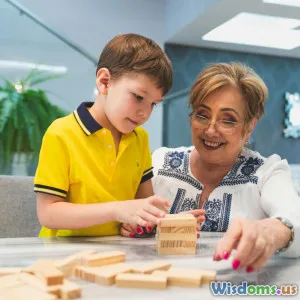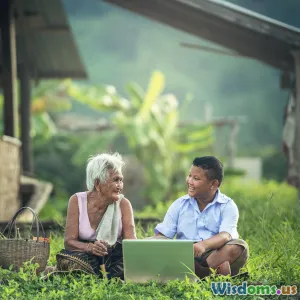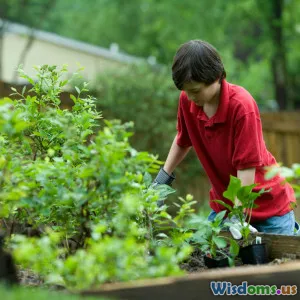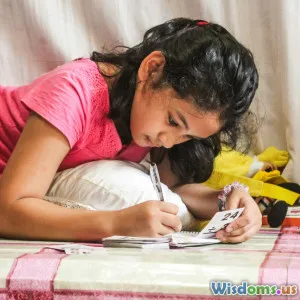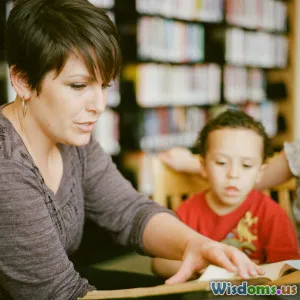
Are Grandparents the Secret Glue in Modern Families
13 min read Explore how grandparents serve as the emotional and practical cornerstone of today’s multi-generational families, shaping family dynamics, stability, and wellbeing in surprising ways. (0 Reviews)
Are Grandparents the Secret Glue in Modern Families?
Introduction: The Unseen Threads Tying Families Together
As families gather for reunions, holidays, birthdays, or even ordinary weekends, there’s often an unassuming presence in the background—setting the tone, sharing wisdom, and making everyone feel a little more rooted. Grandparents, sometimes regarded as the charming storytellers or patient babysitters, may play a far deeper foundational role than is immediately apparent.
In an era marked by geographic mobility, career pressures, and evolving definitions of 'family,' their contributions may be more significant than ever. Are grandparents truly the secret glue holding modern families together? Or are their roles less essential in our hyper-connected yet often fragmented world?
Let’s dive in and unravel how intergenerational bonds, emotional wisdom, practical support, and multicultural traditions intersect—often anchored by a grandparent’s steady presence.
The Essential Role Grandparents Play: More Than Babysitting
1. Historical and Global Perspective
Throughout history—and in virtually every culture—grandparents have played distinctive roles within the family.
- In traditional societies, such as in rural China or sub-Saharan Africa, extended family living arrangements are more common, facilitating daily interaction between grandparents and grandchildren. Why? Grandparents transmit languages, skills, and traditions that children may not encounter in school or online.
- In Western societies, the 20th century brought increased independence and nuclear family models, but even so, the last decade has witnessed a grandparental resurgence—fueled by economic, social, and pandemic factors. In the U.S., Pew Research notes about 20% of grandparents provide regular childcare, and nearly 1 in 10 children now live in a household headed by a grandparent (U.S. Census Bureau, 2021).
2. Emotional and Psychological Stability
Grandparents don’t just provide hugs; they often anchor emotional wellbeing:
- Emotional Safe Haven: For children experiencing parental separation, loss, or stress, a grandparent may offer non-judgmental listening, stability, and unconditional love distinct from that of parents or peers.
- Resilience Specialist: Dr. Karl Pillemer at Cornell University found, “Grandparent involvement is strongly tied to children’s increased resilience against divorce, bullying, or trauma.”
- Building Family Identity: Storytelling, traditions, and even family recipes give children a sense of lineage and belonging—factors psychologists link to higher self-esteem.
Real-World Example
Maria, a single mother in Mexico City, relies on her mother not just for after-school care, but for moral and emotional reinforcement. “When my daughter is confused or anxious, her grandmother talks her through things I sometimes can’t fully articulate myself,” Maria shares. “It deepens our bond and makes our family feel whole.”
Grandparents as Practical Support Systems
1. Childcare: More than a Convenience
With daycare costs soaring and waitlists the norm, many parents turn to grandparents for vital support. In the UK, over 63% of grandparents provide some form of childcare for grandchildren under 16 (Grandparents Plus, 2019).
- Flexibility: Grandparents, often retired, can step in at short notice—helpful for parents working irregular hours.
- Debunking 'Babysitter' Stereotype: Unlike formal caregivers, grandparents impart values and wisdom alongside logistical help. “[Grandparents] provide love, not just supervision,” sociologist Ann Buchanan remarked in her extensive work on intergenerational families.
Case Study: Grandparent-Led Homes
When parents are unable to fulfil caregiving roles due to illness, addiction, or incarceration, grandparents may officially become primary caregivers. In the U.S., over 2.7 million grandparents are raising grandchildren (AARP, 2023) with little institutional support but immense impact.
2. Financial Assistance and Intergenerational Mobility
Beyond direct care, grandparents often offer crucial financial or logistical help:
- Down Payments and College Tuition: According to Fidelity Investments, roughly 1 in 4 grandparents contribute to their grandchildren’s education funds.
- Emergency Safety Net: In some cultures, grandparents open their homes to struggling family members, housing adult children who face job loss or divorce.
- Bridging Generational Inequality: Economist Karen Holden states, “Intergenerational transfers of wealth—not just money, but time and skills—mitigate child poverty and buffer economic shocks.”
Grandparents as Keepers of Culture and Memory
1. Passing Down Traditions and Values
Grandparents often serve as “living libraries,” preserving the customs, values, and family histories that might otherwise disappear. On a practical level:
- Language Transference: Especially in immigrant families, grandparents are key to preserving heritage languages.
- Customs and Rituals: From Diwali celebrations in Indian homes to Passover in Jewish families, grandparents ensure rituals continue and new generations learn their significance.
Example: Survival and Identity
An Italian-American family in New York uses Sunday family dinners led by Grandma Rosa to sustain a sense of unity. Decades-old recipes, tales of migration, and even shared struggles reinforce children’s pride in their roots.
2. Moral and Ethical Guidance
Research highlighted in the Journal of Marriage and Family shows grandparents exert a stabilizing moral influence, from reinforcing honesty and fairness to promoting empathy. In fact, some European studies find grandchildren are less likely to engage in risky teen behaviors if a grandparent is actively involved in their lives.
“A child will listen to me about things that they might rebel against from their mother,” remarks one English grandfather. “It’s a different kind of wisdom.”
The Changing Face of Grandparenting in the 21st Century
1. Distance and Digital Connection
While today’s families are more geographically scattered, technology has sparked an evolution in grandparent-grandchild relationships:
- Video Chats: During the COVID-19 pandemic, 62% of grandparents increased their use of video calls to stay in touch (AARP).
- Shared Interests Online: Whether teaching family recipes via WhatsApp or celebrating milestones on Facebook, tech-savvy grandparents adapt to maintain connections despite distance.
2. Diversity in Modern Grandparenting Roles
- Same-Sex Grandparents: With legal recognitions broadening, many same-sex grandparents serve openly in nurturing roles, broadening family inclusion.
- Step-Grandparents and Blended Families: Pew Research notes that about 12% of U.S. children live with a stepparent, and step-grandparents now play crucial bridging roles.
- Global Migration: In diaspora communities, ‘foster’ or ‘honorary’ grandparents often fill gaps left when families cannot live close to elders, reinforcing that these roles embrace flexibility and social need.
3. Challenges: Health, Care Demands, and Social Policy
- Caregiver Burnout: Full-time caregiving can strain grandparents, especially with limited financial support or declining health. The Grandfamilies Act in the U.S., enacted in 2018, aims to provide assistance, but many gaps remain.
- Cultural Shift: Some societies undervalue elder wisdom, promoting youth-centric models that sideline seniors. This “generational gap” can sometimes cause friction if not navigated consciously.
Real-World Insight
In Scandinavian countries, like Sweden, generous parental leave and social programs support grandparent involvement without overburdening them, offering a model for others.
Psychological and Societal Benefits: The Science Speaks
1. Children with Active Grandparents: The Research
A 2014 study from the University of Oxford found that children with strong grandparent relationships exhibit:
- Fewer emotional and behavioral problems.
- Higher academic performance, partly due to additional encouragement and support.
- Deeper social connectedness, fostering trust and expanding worldviews.
2. Benefits for Grandparents Themselves
Research by the American Psychological Association suggests that grandparents involved with grandchildren tend to:
- Live longer and report greater life satisfaction.
- Experience fewer symptoms of depression and cognitive decline.
- Enjoy a renewed sense of purpose and identity beyond previous work or parenting roles.
“Being needed by grandchildren kept me lively and optimistic,” says retired teacher Elaine Ng. “It goes both ways.”
3. Benefits to Society at Large
- Reduced Social Isolation: Intergenerational ties fight loneliness among elders—a critical issue with direct links to mortality (Holt-Lunstad, 2015).
- Community Stability: Regions with strong grandparental involvement (Southern Europe, Southeast Asia, parts of Africa) also report lower rates of youth delinquency and higher community cohesion.
Looking Forward: Redefining the Grandparent Role
1. Policy Innovations and Cultural Change
Recognizing the broad benefits of grandparental involvement, some societies are reimagining how they integrate and support elder roles:
- Universal Family Leave: Advocates call for paid leave for grandparent-caregivers and support for ‘grandfamilies.’
- Lifelong Learning: Encouraging digital education for seniors helps bridge the tech divide, maintaining connections.
2. What Can Parents and Adult Children Do?
- Invite Participation, Not Just Duty: When parents involve grandparents not just for crisis childcare, but celebrations, daily routines, or schoolwork, intergenerational bonds deepen.
- Respect Boundaries: Open conversations about limits ensure grandparents can provide support without feeling burdened.
- Foster Storytelling: Create rituals that encourage grandparents to share stories, photos, or family lore, enriching identity.
3. Society’s Next Steps
As populations age—the UN forecasts that by 2050, one in six people will be over 65—the potential for positive grandparental involvement is enormous. Communities that recognize elders as assets, not burdens, stand to gain resilience and richer intergenerational bonds.
Conclusion: The Enduring, Adaptive Heartbeat of Family
Are grandparents the secret glue of modern families?
The evidence, both scientific and anecdotal, overwhelmingly says yes. Yet they are not simply passive relics or backup babysitters. Grandparents today are anchors, living bridges between generations, and irreplaceable conduits for wisdom, comfort, and security.
In a period when “family” is frequently reimagined, perhaps one of its most enduring constants is the steady love, resilience, and guidance that only a grandparent can offer.
For those lucky enough to have a grandparent engaged in their lives, the message is clear: cherish and cultivate these bonds. For policymakers and educators, the call is to recognize and amplify the positive ripple effects of grandparent involvement. The glue they provide might just be the substance that holds the diverse tapestry of modern family together.
Rate the Post
User Reviews
Popular Posts











